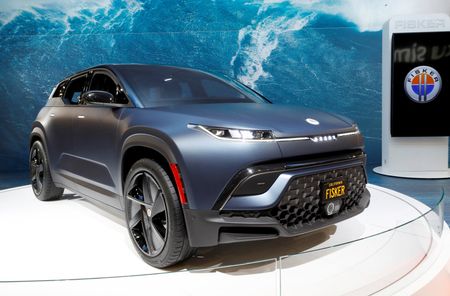 1
1 1
1
By Victoria Waldersee and Joseph White
MUNICH (Reuters) – Electric car maker Fisker Inc is exploring collaboration with other companies to scale up market share faster, Chief Executive Henrik Fisker said on Wednesday.
“Buyers aren’t loyal anymore to their traditional brands. That changes everything. If we collaborate with someone, you can scale quicker … it could be with suppliers, other car companies, tech companies – we are exploring all these avenues,” Fisker said, speaking at the Reuters Automotive Conference in Munich.
Senior executives of rival EV makers Polestar and Smart, the EV brands backed by Mercedes and Chinese automaker Geely, said during interviews at the conference on Tuesday that they are open to partnerships to address supply chain and technology challenges. All three companies are still relatively small and are launching new product lines as larger rivals such as Tesla Inc, China’s BYD and established global automakers are battling for sales by cutting prices.
Fisker said the EV startup has 65,000 reservations for its Ocean SUV, which is being launched from a factory in Austria operated by a unit of Magna International Inc.
He reaffirmed a target of producing 1,400 to 1,700 Ocean EVs this quarter. The company earlier this month cut its full-year production forecast for the Ocean, but Fisker said on Wednesday that problems securing a part for the Ocean’s interior have been resolved.
For now, Fisker’s agreement with Magna allows for production of up to 120,000 Ocean EVs a year from the Magna Steyr plant in Graz, Austria.
Fisker’s next model line, the U.S.-built PEAR, will start at $29,990 and will be shown for the first time on Aug. 3 in Los Angeles, Fisker said. Fisker plans to have the model assembled by contract manufacturer Foxconn at a factory in Ohio.
The PEAR will have 25% fewer parts than a comparable car today, Fisker said. But the company is not following Tesla’s use of large cast parts to cut production costs.
“We didn’t want three giant mega-castings,” and put customers at risk of having to scrap cars after an accident. Instead, Fisker will build vehicles from steel, combining multiple parts into one using single stampings, he said.
Fisker said eventually the company plans to have production capacity in Europe, China, the United States and India.
The company is not planning its production strategy around government incentives, such as the U.S. Inflation Reduction Act, he said. “You cannot react after some politicians… feel like doing something this year, and in four years it gets changed again.”
(Reporting by Joseph White, Victoria Waldersee, Editing by Friederike Heine and Kim Coghill)